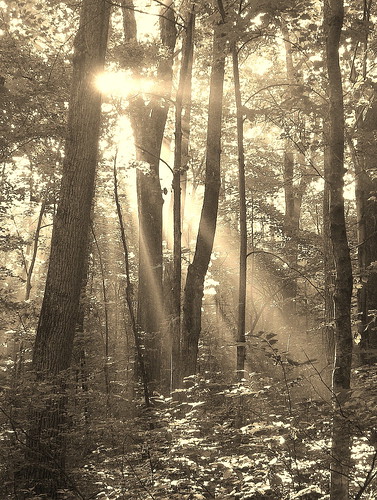
This morning I was listening to Harvey Yoder on WNLR radio out of Churchville. He was discussing a book by Richard Louvs: "Last Child in the Woods." He repeats the often observed problem of kids who simply have no contact with nature. He goes so far as to say one should choose where to live in order to be close to woods, hiking trails, agriculture.
Diane Gordon writes:
"Richard Louv is convinced that such early nature experiences are essential if we are to produce tomorrow’s creative thinkers and change agents. To help prove his point he asked his teenage son, Matthew, to look up biographies of those he calls “the famously creative.” What a wonderful eclectic list he compiled: Science fiction author and futurist Arthur C. Clarke, whose budding cosmic consciousness was awakened by childhood bicycle rides under starry skies: a two-year-old Jane Goodall, sleeping with earthworms under her pillow; Thomas Edison who, as a very young child was found sitting on a clutch of goose eggs, hoping to hatch goslings; and the young Cesar Chavez, inspired by the land, soil, and waters of Arizona’s Gila River regions. Others who made Matthew’s list were Samuel Clemens, T.S. Elliot, John Muir, and Eleanor Roosevelt. "
But that is not news to me. My youth was spent in the woods for as much time as I could get away with. Even as a young child I was able to wander a lot of wonderful wooded places. Perhaps the abundance of such places close at hand was more of a blessing than I will ever know. I'm trying to imagine young Thomas Edison trying to hatch goose eggs.
At The Edge of the Village [click to read] there is a world that each of us, if we are honest, longs to explore. Supressing that longing may be far more dangerous in the long run than indulging it.
Hard Lessons of Wilderness
The men and women who created this Nation and our way of life were largely close to the land. They had learned many lessons there that are all but forgotten in our time. When one considers the mortality rate of settlers like the Pilgrims and the Jamestown settlers, it is clear that nature had provided them with lessons in the unique resourcefulness that built our society.
"It is nearly impossible for modern man to imagine what it is like to live by hunting. The life of a hunter is hard, seemingly continuous overland travel... A life of frequent concerns that the next interception may not work, that the trap or the drive will fail or that the herds will not appear this season. Above all, the life of a hunter carries with it the threat of deprivation and death by starvation." -- John M. Campbell, The Hungry Summer
One has only to visit a cemetary that's existence spans a few centuries to see that survival and reliance on one's wits were important. One's own skills were not enough to guarantee results and faith in the Divine became far more important. A man's atheism was likely to be cured long before he ever saw a foxhole.
Perhaps our greatest loss in an era that considers itself "secure" is the natural destruction of that false confidence that we truly cannot fail. Such hubris seems evident in the recent financial crisis, our continued dependence on foreign oil and our current plans to spend ourselves out of a recession. History shows that we have faced graver challenges in the past, but men came out of our mountains who knew risk and were willing to endure hardship because they had learned it on the edge.
Sunlight in the forest.




No comments:
Post a Comment